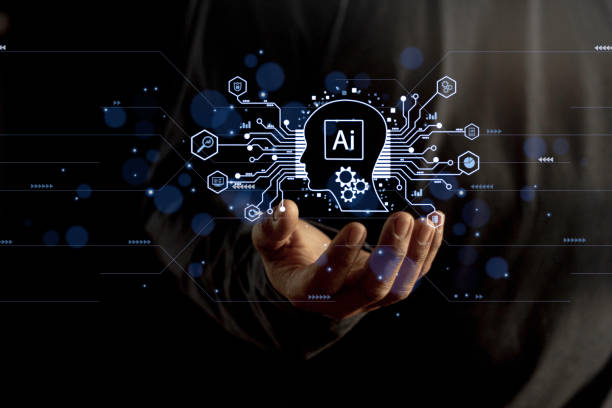What is Artificial Intelligence and What are its Applications?

#ArtificialIntelligence (Artificial Intelligence – AI) is, in short, a branch of computer science that deals with building machines with the ability to think and reason like humans.
The main goal of artificial intelligence is to develop systems that can perform tasks that currently require human intelligence.
These tasks include learning, problem-solving, pattern recognition, natural language understanding, and decision-making.
The applications of artificial intelligence are very broad and diverse.
Some of the most important include:
- Medicine Diagnosis of diseases, development of new drugs, robotic surgery.
- Finance Market forecasting, fraud detection, risk management.
- Automotive Self-driving cars, driver assistance systems.
- Marketing Personalized advertising, customer behavior analysis.
- Manufacturing Automation of production lines, quality control.
Artificial intelligence is rapidly advancing and is expected to play a much more important role in our lives in the near future.
In fact, artificial intelligence, by utilizing complex algorithms and models, is capable of processing vast amounts of data and identifying hidden patterns within them.
This ability allows for more accurate and efficient solutions in various fields.
For example, in medicine, AI-based systems can analyze medical images, diagnose diseases in their early stages, and help doctors choose appropriate treatments.
Are you tired of your online store not generating as much revenue as it could? Rasaweb, a specialist in professional online store design, solves this problem forever!
✅ Increased sales and revenue
✅ Fast loading speed and excellent user experience
⚡ Get free consultation for online store design
Types of Artificial Intelligence: Different Perspectives

Artificial intelligence can be categorized based on various criteria.
One of the most common classifications is based on the level of AI ability, which includes the following:
- Weak AI (Narrow AI) This type of AI is only capable of performing a specific task and performs that task better than humans.
Most AI systems currently in existence are of the weak AI type.
Examples of this type of AI include facial recognition systems, machine translation systems, and game-playing systems. - Strong AI (General AI) This type of AI has cognitive abilities similar to humans and can perform any task that a human is capable of.
Strong AI is still in the research and development phase and has not yet been fully realized. - Super AI (Super AI) This type of AI surpasses human intelligence and can solve problems that humans cannot solve.
Super AI is a hypothetical concept and no examples of it exist yet.
Another classification of artificial intelligence is based on its learning method, which includes the following:
- Supervised Learning In this method, the AI system is trained using labeled data.
- Unsupervised Learning In this method, the AI system is trained using unlabeled data.
- Reinforcement Learning In this method, the AI system is trained by trial and error and receiving rewards and penalties.
Choosing the right type of AI depends on the desired application and the available data.
For example, if the goal is to build a facial recognition system, supervised learning may be a suitable option.
In this method, the system is trained using a set of images of different faces that have been labeled.
After training, the system can recognize new faces with high accuracy.
On the other hand, if the goal is to discover hidden patterns in unlabeled data, unsupervised learning may be a suitable option.
In this method, the system tries to identify patterns in the data without any guidance.
Machine Learning and its Role in Artificial Intelligence

Machine Learning (Machine Learning – ML) is an important subfield of artificial intelligence that allows systems to learn from data without explicit programming.
In other words, instead of the programmer directly telling the system how to perform a task, the system uses machine learning algorithms to identify patterns and relationships in the data and act based on them.
There are different types of machine learning algorithms, each of which is suitable for a specific type of data and problem.
Some of the most common machine learning algorithms include:
- Linear Regression For predicting continuous values.
- Logistic Regression For classifying data.
- Support Vector Machines (SVM) For classification and regression.
- Decision Trees For classification and regression.
- Neural Networks For complex problems such as image recognition and natural language processing.
Machine learning has played a very important role in the advancement of artificial intelligence.
Many advanced artificial intelligence systems use machine learning algorithms to perform various tasks.
For example, facial recognition systems, machine translation systems, and product recommendation systems all benefit from machine learning.
To better understand the concepts, a table of different types of machine learning algorithms and their applications is provided:
| Machine Learning Algorithm | Application Type | Example |
|---|---|---|
| Linear Regression | Predicting continuous values | Predicting housing prices |
| Logistic Regression | Classifying data | Detecting spam emails |
| Support Vector Machines | Classification and regression | Diagnosing the type of disease |
| Decision Trees | Classification and regression | Decision-making on granting loans |
| Neural Networks | Complex problems | Image recognition |
Also, another table for comparing machine learning and artificial intelligence:
| Feature | Artificial Intelligence | Machine Learning |
|---|---|---|
| Definition | Creating intelligent machines | Learning from data without explicit programming |
| Goal | Simulating human intelligence | Improving performance using data |
| Domain | Broader | A subset of artificial intelligence |
Deep Neural Networks and Their Impact

Deep Neural Networks (DNNs) are a type of artificial neural network that consists of multiple layers of nodes (neurons).
These layers allow the system to identify more complex and abstract patterns in the data.
Deep neural networks have achieved significant advances in various fields in recent years, such as image recognition, natural language processing, and game-playing.
One of the most important factors in the success of deep neural networks is access to vast amounts of data and the high processing power of computers.
These facilities allow researchers to train deep neural networks using very large amounts of data and use them to solve complex problems.
Some of the important applications of deep neural networks include:
- Image Recognition Face recognition, object recognition, scene recognition.
- Natural Language Processing Machine translation, text generation, sentiment analysis.
- Game-Playing Video games, board games.
- Self-Driving Navigation systems, car control systems.
The impact of deep neural networks on artificial intelligence has been very large.
These networks have enabled artificial intelligence systems to perform tasks that previously seemed impossible.
For example, facial recognition systems based on deep neural networks have very high accuracy and can recognize faces in different lighting and angular conditions.
Also, machine translation systems based on deep neural networks provide more fluent and accurate translations.
In fact, deep neural networks, by mimicking the structure of the human brain, are able to process information hierarchically.
Each layer of the network extracts specific features from the data, and these features are transferred to the next layers.
Finally, the last layer of the network makes the final decision based on the information collected in the previous layers.
This process allows deep neural networks to identify complex patterns with high accuracy.
Are you losing potential customers due to an unprofessional website? Rasaweb is your answer! With our specialized corporate website design services:
✅ Enhance the credibility and standing of your business
✅ Experience attracting more targeted customers
⚡ Act now to receive a free consultation!
Natural Language Processing (NLP) and its Relationship to Artificial Intelligence

Natural Language Processing (NLP) is a branch of artificial intelligence that allows systems to understand and interact with human language.
The main goal of NLP is to develop systems that can analyze text and speech, extract their meaning, and answer questions.
NLP has extensive applications in various fields such as machine translation, sentiment analysis, chatbots, and information retrieval.
Some of the most important NLP tasks include:
- Parsing Determining the grammatical structure of sentences.
- Semantic Analysis Extracting the meaning of sentences.
- Named Entity Recognition (NER) Identifying and classifying proper nouns in text.
- Sentiment Analysis Determining the author’s attitude or feeling about a particular topic.
- Machine Translation Translating text from one language to another.
NLP is closely related to artificial intelligence.
Many NLP systems use machine learning algorithms and deep neural networks to perform various tasks.
For example, machine translation systems based on deep neural networks have very high accuracy and can provide more fluent and accurate translations.
Also, chatbots use NLP to understand users’ questions and answer them.
Natural language processing has increasingly entered our daily lives.
From voice assistants like Siri and Alexa to automated response systems in call centers, NLP plays an important role in facilitating communication between humans and computers.
For example, in the field of machine translation, NLP systems use complex algorithms to analyze the text in the source language and produce its equivalent in the target language.
By learning from a vast amount of linguistic data, these systems are able to provide high-quality translations.
Also, in the field of sentiment analysis, NLP systems examine the words and phrases in the text, recognize the author’s feelings, and classify them.
This information can be used in various fields such as marketing, surveys, and social media analysis.
Artificial Intelligence and the Future of Jobs

The impact of artificial intelligence on the future of jobs is a hot and controversial topic.
Some believe that artificial intelligence will eliminate many jobs, while others believe that artificial intelligence will create new jobs and help humans work more efficiently and creatively.
In fact, both views are partially correct.
Artificial intelligence will certainly automate some tasks and jobs.
Jobs that are repetitive and routine are more at risk of automation.
On the other hand, artificial intelligence will also create new jobs.
Jobs that require creative skills, problem-solving, and human interaction are less at risk of automation.
Some of the jobs that are expected to be in demand in the future include:
- Artificial intelligence and machine learning specialists
- Data analysts
- Cybersecurity specialists
- Robotics engineers
- Healthcare professionals
To succeed in the future of work, it is essential that people acquire the skills necessary to work with artificial intelligence.
These skills include technical skills such as programming and data analysis, as well as soft skills such as critical thinking, problem-solving, and communication.
In general, artificial intelligence, as a powerful tool, can help people perform better at work and increase their productivity.
However, at the same time, it is necessary for people to prepare for the changes caused by artificial intelligence and acquire the skills necessary to work in the world of the future.
For example, in the field of manufacturing, robots and automation systems can perform many repetitive and dangerous tasks.
This allows workers to focus on more complex and creative tasks.
Also, in the field of customer service, chatbots and virtual assistants can answer customer questions and solve their problems.
This allows customer service employees to focus on more complex and important issues.
Finally, artificial intelligence can help improve the quality of life for humans.
By automating repetitive and dangerous tasks, people can spend more time and energy on activities they enjoy.
Challenges and Ethical Concerns of Artificial Intelligence

Artificial intelligence, despite its many benefits, also presents numerous challenges and ethical concerns.
Some of these challenges include:
- Discrimination Artificial intelligence algorithms may make discriminatory decisions due to discriminatory training data.
- Privacy Artificial intelligence systems can collect and analyze vast amounts of data, which can lead to violations of individuals’ privacy.
- Accountability If an artificial intelligence system makes a mistake, it is difficult to assign responsibility.
- Security Artificial intelligence systems may be subject to cyberattacks and used for malicious purposes.
- Control With the advancement of strong artificial intelligence, there are concerns about controlling artificial intelligence systems and preventing their misuse.
To address these challenges and concerns, it is necessary to develop ethical and legal standards for the development and use of artificial intelligence.
It is also necessary to provide training to people about the challenges and dangers of artificial intelligence.
Ethical issues of artificial intelligence should be taken seriously to prevent misuse of this technology and to protect the rights and freedoms of individuals.
In fact, one of the most important ethical challenges of artificial intelligence is the issue of transparency.
Many artificial intelligence algorithms, especially deep neural networks, act as black boxes.
This means that we cannot fully understand why an artificial intelligence system has made a particular decision.
This lack of transparency can lead to mistrust and concern about the misuse of artificial intelligence.
To solve this problem, it is necessary for artificial intelligence researchers and developers to strive to develop more transparent and understandable algorithms.
Artificial Intelligence in Iran: Opportunities and Challenges

Artificial intelligence in Iran provides many opportunities for development and progress in various fields.
Iran has a specialized and talented workforce in the field of information and communication technology that can play an important role in the development and implementation of artificial intelligence.
Some of the opportunities for artificial intelligence in Iran include:
- Development of advanced industries
- Improvement of government services
- Increasing productivity in the agricultural sector
- Improving the quality of health and medical services
- Creating new job opportunities
However, the development of artificial intelligence in Iran also faces challenges.
Some of these challenges include:
- Lack of investment
- Lack of necessary infrastructure
- Lack of training data
- Legal and regulatory restrictions
- Lack of ethical standards
To overcome these challenges and take advantage of the opportunities for artificial intelligence in Iran, it is necessary for the government, the private sector, and universities to work together.
The government must provide financial and legal support to create the conditions for the development of artificial intelligence in Iran.
The private sector must invest in artificial intelligence research and development to help commercialize this technology.
Universities must train specialized manpower and conduct advanced research to help advance artificial intelligence science in Iran.
For example, the government can encourage companies active in the field of artificial intelligence by providing tax facilities and low-interest loans.
Also, the government can create technology parks and innovation centers to provide a platform for cooperation between companies and universities.
The private sector can also help develop new technologies by investing in artificial intelligence startups.
Universities can also train the human resources needed for the development of artificial intelligence by holding training courses and specialized workshops.
Is the current design of your online store causing you to lose customers and sales?
Rasaweb is your solution with modern and user-friendly online store designs!
✅ Significantly increase conversion rates and sales
✅ Create strong branding and gain customer trust
⚡ Get a free online store design consultation from Rasaweb!
Resources and Tools for Learning Artificial Intelligence

Learning artificial intelligence requires access to appropriate resources and tools.
Fortunately, today there are many resources and tools available for learning artificial intelligence.
Some of these resources and tools include:
- Online Courses Online educational platforms such as Coursera, edX, and Udacity offer a variety of courses in the field of artificial intelligence.
- Books There are many books on artificial intelligence that can help you learn basic and advanced concepts.
- Scientific Articles Scientific articles published in reputable journals and conferences can familiarize you with the latest achievements in artificial intelligence.
- Programming Tools Programming languages such as Python and R are powerful tools for developing artificial intelligence systems.
- Software Libraries Software libraries such as TensorFlow, PyTorch, and scikit-learn are ready-made tools for implementing artificial intelligence algorithms.
- Data Sets Large and diverse data sets are essential for training and evaluating artificial intelligence systems.
To start learning artificial intelligence, it is recommended that you first familiarize yourself with basic concepts such as machine learning, neural networks, and natural language processing.
Then, you can expand your knowledge in these areas using online courses, books, and scientific articles.
Finally, you can implement your own artificial intelligence systems using programming tools and software libraries.
For example, if you are interested in learning machine learning, you can use the online course “Machine Learning” offered by Andrew Ng on Coursera.
This course teaches the basic concepts of machine learning comprehensively and practically.
Also, if you are interested in learning about neural networks, you can use the book “Deep Learning” by Ian Goodfellow, Yoshua Bengio, and Aaron Courville.
This book is recognized as one of the best resources for learning about neural networks.
Finally, to implement artificial intelligence systems, you can use the Python programming language and the TensorFlow and PyTorch software libraries.
These tools provide extensive facilities for the development and implementation of artificial intelligence algorithms.
Here is a table of useful resources for learning artificial intelligence:
| Source | Type | Description |
|---|---|---|
| Coursera | Online Course | Various courses in the field of artificial intelligence and machine learning |
| edX | Online Course | Various courses in the field of computer science and artificial intelligence |
| Udacity | Online Course | Specialized nanodegrees in the field of artificial intelligence and deep learning |
| “Deep Learning” by Goodfellow et al. | Book | Comprehensive reference in the field of deep learning |
| TensorFlow | Software Library | Open source library for machine learning development |
| PyTorch | Software Library | Open source library for deep learning development |
The Future of Artificial Intelligence and the Road Ahead

The future of artificial intelligence is very bright and full of potential.
With continuous advances in machine learning, deep neural networks, and natural language processing, it is expected that artificial intelligence systems will be able to perform tasks that currently seem impossible in the near future.
Some of the future prospects of artificial intelligence include:
- Development of strong artificial intelligence
- Greater automation of tasks and jobs
- Improving the quality of life for humans
- Development of new technologies such as self-driving cars, home robots, and intelligent personal assistants
- Solving complex problems such as climate change, incurable diseases, and poverty
However, to realize these prospects, it is necessary to seriously address the challenges and ethical concerns of artificial intelligence.
Also, it is necessary to make the necessary investments in artificial intelligence research and development and to train specialized and talented human resources in this field.
The future of artificial intelligence is in our hands.
With proper planning and effort, we can use the potential of artificial intelligence to build a better world.
In fact, one of the most important future trends in artificial intelligence is the development of Explainable AI (XAI).
XAI seeks to create artificial intelligence systems that are able to explain their decisions in a transparent and understandable manner.
This can help increase trust in artificial intelligence and its acceptance in various fields.
Also, the development of Collaborative AI is also of great importance.
Collaborative AI seeks to create systems that are able to cooperate effectively with humans and help them perform various tasks.
This can help increase productivity and improve the quality of life for humans.
In addition, Distributed AI is also of great importance.
Distributed AI seeks to create systems that are able to operate in large and complex networks of devices and sensors.
This can help collect and analyze more data and provide smarter solutions.
Finally, Self-Learning AI is also of great importance.
Self-Learning AI seeks to create systems that are able to learn from data and improve their performance without the need for human intervention.
This can help reduce costs and increase the speed of developing artificial intelligence systems.
FAQ
| Question | Answer |
|---|---|
| What is the definition of Artificial Intelligence (AI)? | It is a field in computer science that aims to create intelligent machines that can think, learn, solve problems, and make decisions like humans. |
| Mention some common applications of AI. | These include self-driving cars, voice assistants (such as Siri and Alexa), recommendation systems (such as Netflix and Amazon), facial recognition, and medical diagnosis. |
| What is the difference between Narrow AI (ANI) and General AI (AGI)? | Narrow AI specializes in a single, specific task, while General AI possesses human intellectual ability to perform any cognitive task. |
| What is Machine Learning and its relationship to AI? | Machine learning is a branch of AI that focuses on developing algorithms that allow systems to learn from data without explicit programming. |
| What are Artificial Neural Networks? | They are computational models inspired by the structure and function of the human brain, and are used in deep learning to process data and discover complex patterns. |
| Mention some ethical challenges related to AI. | These include issues of privacy, bias in data and algorithms, job losses, and accountability in the event of errors or unfair decisions. |
| What is Natural Language Processing (NLP)? | It is a branch of AI that focuses on enabling computers to understand, interpret, and create human language in a meaningful and interactive way. |
| How can AI affect the job market? | It can lead to the automation of some routine tasks, requiring retraining of workers and creating new jobs in the areas of design, development, and maintenance of AI systems. |
| What is Computer Vision? | It is a field in AI that enables computers to “see” and understand and interpret images and videos in the same way that humans do, enabling them to recognize objects and faces. |
| What is the importance of data in developing AI systems? | Data is the fuel that feeds AI systems, especially in machine learning. The quality and quantity of data greatly affect the accuracy and performance of models and their ability to learn and make correct decisions. |
And other services of Rasa Web Advertising Agency in the field of advertising
Smart SEO: Transform user interactions with the help of real data.
Intelligent Conversion Rate Optimization: A fast and efficient solution for user interaction with a focus on attractive user interface design.
Intelligent Custom Software: A professional solution for analyzing customer behavior with a focus on dedicated programming.
Smart Social Media: Professional optimization for digital branding using key page optimization.
Intelligent Link Building: A combination of creativity and technology to improve SEO ranking through SEO-driven content strategy.
And more than hundreds of other services in the field of internet advertising, advertising consulting and organizational solutions
Internet Advertising | Advertising Strategy | Report Advertising
Resources
What is Artificial Intelligence?
,Artificial Intelligence and Everything About It
,Artificial Intelligence (Wikipedia)
,Artificial Intelligence Technology Review
? For the rise of your business in the digital world, Rasaweb Afrin, by providing innovative marketing solutions and fast website design and professional, is with you to have a strong and lasting presence.
📍 Tehran, Mirdamad Street, next to the Central Bank, Kazerun Jonoubi Alley, Ramin Alley No. 6
“`



